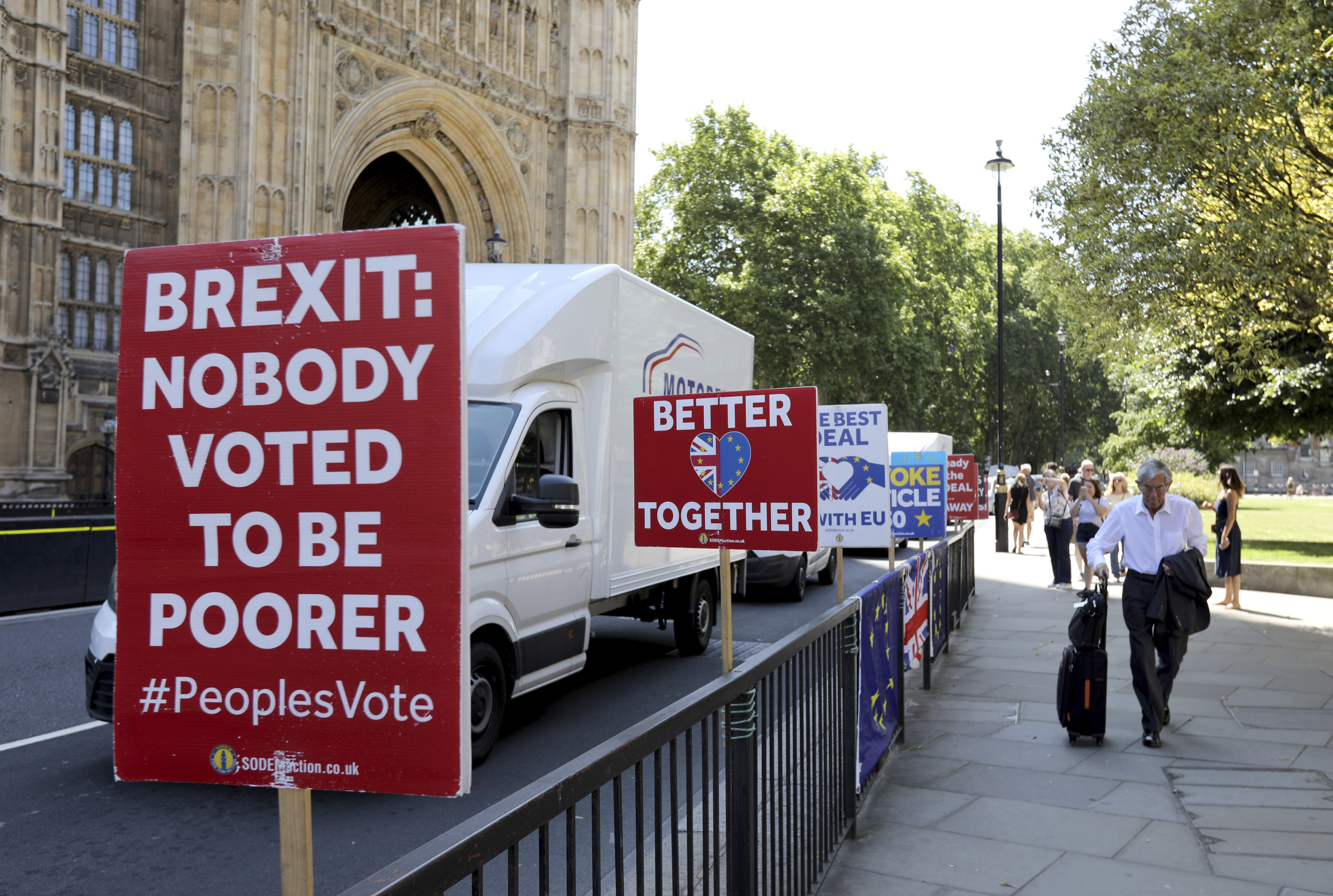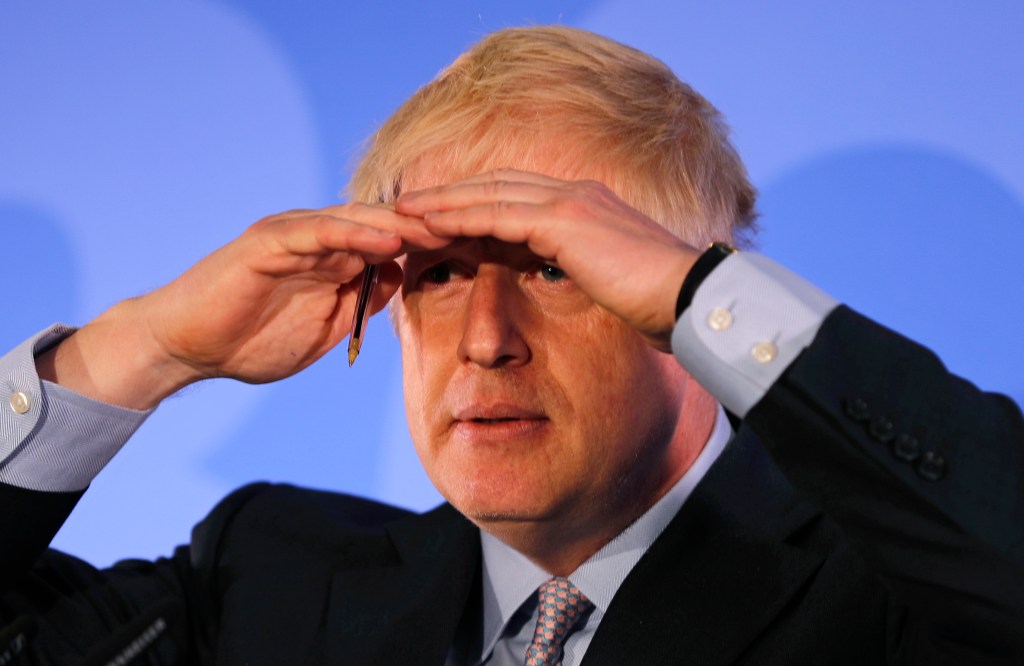LONDON — Boris Johnson, the man tipped to become Britain’s next prime minister, caused alarm Monday when he boldly pledged to leave the European Union in October, deal or no deal.
Not so long ago, leaders of Europe’s populist right-wing movements would have publicly applauded the sentiment, viewing Britain’s departure as the first domino that would trigger an inevitable mass exodus from the 28-member bloc. Now, virtually no one thinks that’s a good idea.
Videos by VICE
For three years, Europeans have watched their British neighbors limp through an unending political crisis that has already claimed two prime ministers, bitterly divided the public, and left the country on the brink of an economically disastrous “no-deal” exit.
Watching that horror show has inspired a sense of appreciation for the oft-maligned EU. Across the continent, public support for the EU has surged, while the populist euroskeptic parties that once called for their own national exit from the bloc have quietly changed their tune.
“This idea that a country could easily do better outside the EU has been discredited by Brexit,” Larissa Brunner, a policy analyst at the European Policy Centre, told VICE News.
“Straight after the Brexit referendum, there was a lot of talk about a domino effect, of similar referenda in other member states. But Brexit has had completely the opposite effect. It’s not difficult to see why.”
Brexit has been such a debacle that it has effectively killed the rising EU secessionist movements that, just a few years ago, appeared poised to take hold across Western Europe. Its impact can be seen from Scandinavia to the Mediterranean, where virtually every influential populist, euroskeptic party that had previously called for their own version of Brexit has changed course. The message now is: remain, and reform from within.
In France, far-right leader Marine Le Pen — who in 2015 dubbed herself “Madame Frexit” — has dropped her calls to quit the bloc, after her harsh anti-EU rhetoric cost her badly in the 2017 presidential campaign, analysts say. Italy’s Deputy Premier Matteo Salvini, whose Lega party once promised a referendum on euro membership, assured voters in February: “We have no intention of leaving Europe. We want to change it, improve it, but not abandon it.”
In Austria, the former head of the far-right Freedom Party, Heinz-Christian Strache, explicitly ruled out a referendum on EU membership before forming a coalition government in December 2017. (Strache has since been dumped out of politics in a corruption scandal.)
And in January, the far-right Sweden Democrats announced a U-turn on their calls for a “Swexit.” Weeks earlier, the fiercely eurokceptic Alternative for Germany declared that it would campaign for a “Dexit” only if its demands for reform were not met.

The sudden shifts in position from leading euroskeptics, analysts say, is directly related to Brexit’s politically toxic reputation with the public. “All the major euroskeptic parties have abandoned this — at least for the time being,” Stefan Lehne, a visiting scholar at Carnegie Europe in Brussels, told VICE News. “They’ve realized that this is going to lose them elections.”
In France, Germany, the Netherlands, Spain, Sweden and even the U.K., support for the EU leapt by at least 10 percentage points in the wake of the vote, according to Pew polling data. A separate Eurobarometer poll last year showed that 67 percent of Europeans believed their country benefited from belonging to the bloc, the highest in more than three decades.
“The really big shift took place in 2017, less than a year after Brexit. That’s when you saw a pretty clear pattern of people turning more positive toward [the EU],” Richard Wike, director of global attitudes and research at Pew Research Center, told VICE News.
“Brexit has shown quite clearly how difficult it is to leave the EU”
“Brexit had a big impact on it. I think that sometimes when political institutions are challenged, you’ll see people pushing back against that challenge, and maybe seeing some things that they value in that institution.”
Voters’ newfound appreciation for the EU — and wariness of leaving the bloc — has only increased with Britain’s shambolic experience since. Outgoing PM Theresa May has repeatedly failed to get her proposed exit deal with the EU passed by Parliament, forcing her to stand down. Her likely replacement, the arch-Brexiteer Johnson, is now openly entertaining the prospect of a “no-deal Brexit” — a worst-case scenario that analysts warn will seriously damage Britain’s economy.
“Brexit has shown quite clearly how difficult it is to leave the EU, and that there are actually a lot of advantages to being in the EU,” said Brunner.
She said the fact that Britain — which had always held an ambivalent, one-foot-in, one-foot-out approach to the EU — had struggled so badly to extricate itself from the EU, had underlined the reality that countries more deeply entrenched in the European project would only find it more difficult. Unlike most of its EU neighbors, Britain is not a member of the 26-member Schengen area, whose members have scrapped controls on their mutual borders, nor is it one of the 19 countries that use the euro as currency.
“If you’d looked at all the EU member states five years ago and thought, ‘Which country could make a success of leaving?’, the U.K. would have been at the top of the list,” said Brunner. “A lot of people think that if a country like the U.K. can’t make it work, then they won’t be able to either.”
“The problem with Brexit was it was a yes or no question. Then everyone looked at each other and asked, ‘Now what?’”
While all the influential populist euroskeptic movements have shelved their calls to leave the EU, some more marginal groups are pushing ahead with their own referendum. The most significant of these, said Lehne, was the Netherlands’ new Forum for Democracy — although the party only managed to win three of the 26 seats on offer in May’s European Parliament elections, with about 11 percent of the vote.
Michiel Hoogeveen, the party’s spokesman for European affairs, told VICE News that Brexit hadn’t deterred his party from favoring a Dutch EU referendum, but he acknowledged that Britain’s chaos had dampened enthusiasm among the Dutch public for a “Nexit.”
“Obviously the negative news has to an extent altered public opinion in the Netherlands, and pro-EU parties are very thankful for that political chaos,” he said.
While Britain’s experience hadn’t dissuaded his party from campaigning to leave the EU, it had clearly shown how not to hold a referendum. “We explicitly say we don’t want a Brexit situation — when we have a referendum, we should have different options,” said Hoogeveen. “The problem with Brexit was it was a yes or no question. Then everyone looked at each other and asked: ‘Now what?’”
Hoogeveen says his party believes the current public warmth for the EU is just a temporary blip — and that as life in Britain goes on post-Brexit, interest across the Continent in exploring their options outside the EU will rise again.
For his part, Lehne agrees, saying the current silence from the euroskeptic right on quitting the EU is purely opportunistic. “I think this is a short-term thing,” he said.
“If Brexit actually happens and Britain doesn’t sink into the Atlantic altogether, then a precedent has been set. And the next time a crisis occurs in the EU, these parties may well resume their calls to leave. They’ve not really changed their underlying philosophy, just their messaging.”
Cover: Britain’s Conservative Party lawmaker Boris Johnson gestures as he speaks during the official launch of his leadership campaign, in London, Wednesday June 12, 2019. Boris Johnson solidified his front-runner status in the race to become Britain’s next prime minister on Tuesday, gaining backing from leading pro-Brexit lawmakers.(AP Photo/Frank Augstein)




